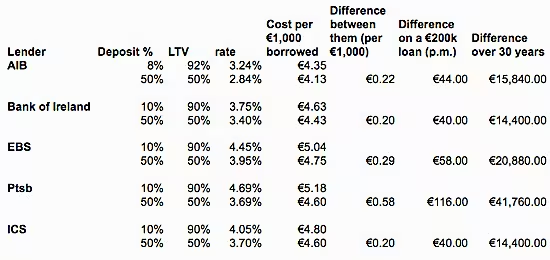People are fixated with property prices, the wide coverage of the CSO property price index is in clear contrast to how little people track bank mortgage rate changes (although we are also fixated on ECB interest rate changes). The cost of something is different than the price of something, sadly we tend to look at prices and disregard costs far too often.
In that respect we are seeing a two tier mortgage market develop, where costs will vary not depending on your ability to repay the loan, but more so on how large a deposit you pay. There are reasons for this – for a start, the bank prefer lower risk business, the more equity you have (your deposit) the less they have to worry if prices drop or you stop paying.
This is because any loss always eats through the borrowers' equity first, not the banks loan on the property. This is achieved by holding the 'first lien' or right to the property, meaning that in any sale the bank gets their money before the owner does.
Take a look at the difference, on a €200,000 loan in two examples, where the gross loan is the same but the actual security position of the property is different (one is where the €200,000 represents a 90%-92% loan, the other is where this represents 50% or less).
You see that it can make a cost difference of €14,400 to €41,760 over the life of the loan! Bearing in mind that this is the same amount of money lent, the only difference being the 'risk' the bank perceive by the loan versus the value (LTV) being high.
That is part of the reason that 100% mortgages were such a bad idea for banks, even if prices fell 2% they were the ones carrying the can, the borrower carries a debt, but the maximum risk is on the lender when a loss is realised. Granted, they can get judgements and such against a borrower but that is a secondary issue if you have to support that risk up front as a bank does.
So when you hear 'banks are not lending' – and don't just take the catastrophic reduction in credit advancements from the banks themselves as the only evidence – it is generally being mentioned in relation to regular borrowers who don't have a 50% deposit, because the moneyed up people with large deposits don't have an issue getting credit.
That they are in a minority is a given, but there are still people in that category and the banks do like to deal with them and also offer preferential pricing because of it.
With any luck we won't go the route the UK has where depending on your deposit it could be as much as twice the price! The Capital Adequacy rules are being blamed there. It is true that mortgages require a higher capital adequacy (than government bonds for instance which require none for the most part), but that doesn't explain away a full doubling of the relevant rate!
If we thought our banks were out there to gouge, just be thankful we don't have the situation they do across the water!







